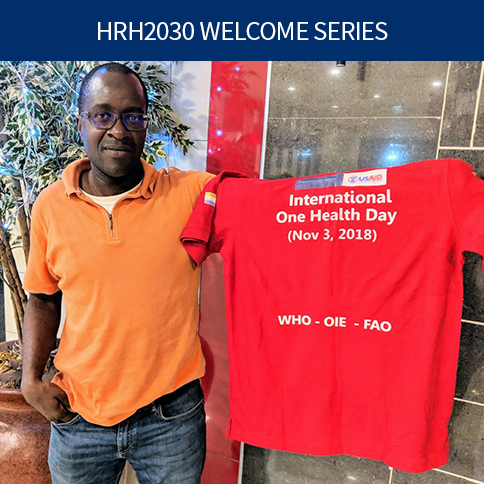
06 Feb Three Questions with Dr. Serge Kouadio Agbo: Tackling Public Health Threats in Côte d’Ivoire
Dr. Serge Kouadio Agbo joins HRH2030 as a multisectoral health security advisor on the One Health activity in Côte d’Ivoire. One Health seeks to build-in country capacity to implement the Global Health Security Agenda. A medical doctor by training, Dr. Serge holds an MPH in the epidemiology of infectious diseases from Tulane University. Dr. Serge’s background includes extensive experience in the areas of immunization, monitoring and evaluation, HIV/AIDS and TB/HIV co-infection, and neglected tropical diseases.
- We would love to learn more about you! What inspired you to work in health?
For the past ten years, I have worked on vaccine preventable diseases, TB, HIV, TB/HIV co-infection, and neglected tropical diseases. I have held positions throughout West and Eastern Africa in Mali, Burkina Faso, Guinea, Sierra Leone, and of course my home country of Côte d’Ivoire. I became involved in global health security when I was working on trachoma in Côte d’Ivoire. It was through this experience that I realized the solution to disease elimination was through multisectoral coordination. Multisectoral coordination served as a very important basis for my work in post-Ebola Guinea and Sierra Leone and helped me delve into the areas of emergency preparedness and endemics.
- In your opinion, what are some of the most significant challenges health workers face in Côte d’Ivoire?
In Côte d’Ivoire, two major challenges that health workers face are a poor work environment and lack of resources for appropriate health service delivery. As a result, there is a lack of health worker motivation and commitment to their work which leads to poor health service delivery within an already weak health system. Although Côte d’Ivoire’s economy is leading in the region, when we look at most of the health–related monitoring indicators, the nation’s performance has been very low for years and has not improved at a significant rate. Therefore, there is a strong need for the government to rethink the structure of the current health system.
- Working with HRH2030 through One Health, what do you hope to improve in Côte d’Ivoire’s health system?
With the experience of the 2014-2016 Ebola epidemic, it is very clear that a multisectoral coordination mechanism is necessary to tackle public health threats. One Health has just been initiated in Côte d’Ivoire. While there is currently very little political commitment due to other social and economic priorities, I hope that HRH2030’s support of One Health at a political and technical level will improve political will, engagement, and commitment moving forward. HRH2030’s support along with strong political commitment will help to establish a solid ground for multisectoral coordination.
Photo: Dr. Serge Kouadio Agbo joins HRH2030 as a multisectoral health security advisor for the One Health activity. He hopes to establish a solid ground for multisectoral coordination to tackle public health threats in Côte d’Ivoire.





